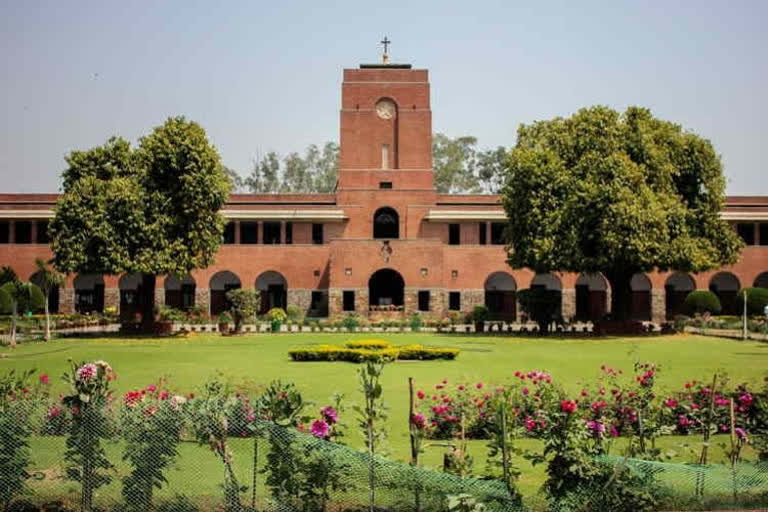New Delhi: Delhi University turned a hundred years old this year. The university started with three colleges: St. Stephen's, Ramjas and Hindu College. ETV's National Bureau Chief Rakesh Tripathi spoke to St. Stephen's alumnus Kunwar Natwar Singh, a veteran politician, and former external affairs minister about his days as a student and how the institute shaped his career.
Singh did his B.A. from St. Stephen's from 1948 to 1951 and then went to Cambridge University for further studies. He remained close to Pandit Jawaharlal Nehru and was later selected in the Indian Foreign Service. Here are some of the excerpts from the interview:
ETB: Delhi University has turned 100 this year. You have been a student of St. Stephen's. How do you remember your university days?
Natwar Singh:St. Stephen's is the number one college in North India. There is no doubt about it. When I entered in 1948, there were 390 students. 120 in the hostel and the rest were day scholars. There were three teachers on the English staff. Although it was a Christian college, the administration never tried to enforce religion on the students. It made a big difference. The academic record of the college was excellent.
Interview: 'When General Zia-ul-Haq offered St. Stephen's students his personal plane' I came first class first in college. I was also the president of the college's student union. I was also Tennis Champion of Delhi University, Junior Tennis Champion of Delhi State, I was on the Football team, Hockey team, Cricket team, and Athletics team. Now there are about 1200 students, which is a lot. If I were the principal, I would not have allowed the number to go up. When numbers increase, excellence suffers.
Also read: Exclusive: Amarinder BJP's trump card in Punjab; Congress a sinking ship, says Natwar Singh
ETB: What was your first day of college, do you remember anything of it?
Natwar Singh:I used to live in the hostel. During the first week or two, the seniors made us sing songs and introduce ourselves. It was ragging but in a very civilized manner. I studied at Delhi University for three years, then I went to Cambridge University for further studies.
ETB: Former Pakistan president General Muhammad Zia-ul-Haq also studied in St. Stephen's. Have you ever met him during your bureaucratic or political career?
Natwar Singh:Zia-ul-Haq was very proud that he had studied at St. Stephen's. He was born in Delhi and left the college in 1947. I joined a year after that. Once a group of students of St. Stephen's visited Pakistan. I was the Ambassador of India in Islamabad in those days and I had good relations with the President. I told him, 'Sir some boys and the principal of St. Stephen's College have come and want to meet you, could you give me 10 minutes? The General said, "10 minutes! I will invite them and we will have dinner together.
In the evening when we went for dinner, there were four cabinet ministers, and five vice-chancellors present. The students were stunned that the President had invited them to dinner. The principal had brought a 1942 group photo in which Zia-ul-Haq was seen standing in a corner. The principal pointed out to him in the photo. General Zia-ul-Haq was moved after seeing it and thanked the principal.
He then asked the students about their travel plan. They replied that they were going to Mohenjodaro tomorrow and then to Karachi. General Sahib asked how are you guys going. The boys said that they would go by train. General Zia-ul-Haq called his ADC and arranged his personal plane for the students. Such was the love for Delhi University. India-Pakistan relations were not good. But General Zia-ul-Haq had one good quality. He was extremely well-mannered.
ETB: But he was considered to be a shrewd and tough dictator?
Natwar Singh: He had some qualities. He used to walk with me out to drop me at my car even though he was the president of the country. General Zia-ul-Haq used to treat everyone very politely.
ETB: Did you ever go to your college again?
Natwar Singh:I used to visit St. Stephens for around 20 years. As long as the teachers of our time were there. Now some have passed away, some have retired. But for about 20-25 years after leaving college, I kept direct contact with the college and the university.
